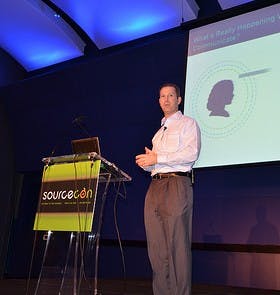Could you imagine a life without trust? What about a career without trust? Or even a relationship without trust? Trust is a huge component of civilization. Trust is what defines relationships and it’s an imperative module in our industry. Adam Lawrence defined it in his keynote presentation: “Trust is the new ROI.”
As sourcers, we are always looking for new technology and tools to lead us to our next placement; those are the hard skills that drive creativity and innovation in our industry. There will always be buzz in the sourcing community on who is using the latest shiny new tool, or who discovered the new Boolean technique, or who found the new stalker site. But seldom do we talk about the soft skills that define who we really are. Trust is and should be the foundation of our industry.
Candidates trust sourcers with their most important personal information and decisions. Recruiters trust sourcers to find the best talent. Hiring managers trust recruiters to place the best candidates. It’s a never ending cycle.
As featured in Lawrence’s presentation:
“Trust is the glue of life. It’s the most essential ingredient in effective communication. It’s the fundamental principle that holds relationships.” – Stephen Covey
Trust, or the lack thereof, has always been a topic of debate in our industry. Many sourcers and recruiters have been burned by the “stealing of ideas” or “being thrown under the bus.” This also conveys over to our relationships with our candidates. Not every candidate has had an amazing experience with a sourcer or even with a recruiter during the hiring process. Indeed this can lead to a lack of trust and lack of trust will sometimes alter our decisions. When this happens we tend to make mistakes and develop biased opinions. It also can lead to avoiding, rather than be doing. As Lawrence best stated, we all come from a different background and we have all had different experiences, and grew up with different values. Each individual is interpreting those experiences in different ways. Everyone has a set of biases that they bring into a conversation and we don’t walk into these conversations overexposing topics that will help us reach a common agreement.
Lawrence views talent and acquisition as a supply chain in that when you look at lean methodologies, it’s easy to process out things that are not efficient, such as a level of trust.
One of the most important professional relationships needs to be assembled on trust. Whether it’s the relationship with a candidate, recruiter, or hiring manager, we need to trust others experiences, opinions and ideas to complete our ROI. Most of us have held the role as a sourcer or as a recruiter, and we have all taken different paths to find our purple squirrel. As Lawrence best defined this, it’s a silly attitude to think your way is the best bay. Amybeth Hale also has said that you can give a researcher a search assignment, and depending on what path that researcher chooses to follow, they will get different results. Go back and do the search again and choose to follow a different source lead, and you will end up with a completely different result. Now that is trusting a sourcer!
It’s hard to work with someone without trust. It’s also hard to engage our talent without trust. As Lawrence contributed, the sourcing pendulum is swinging back to engagement. The need and importance for engagement will always be a heavy weight in our industry. There has been a lot of talk at SourceCon conference about mobile sourcing (case and point, my presentation). Undoubtedly mobility will be the wave of the future. It’s exciting to have new tools and tricks for us to engage our audience. Just remember that our candidates all come from different backgrounds and experiences. Lawrence recommends that we take the steps and cautions that we need to ask into the marketplace and avoid some of the mistakes in finding the people that aren’t easy to find and serving them with an attractive message.
Lawrence calls these mistakes, and his past mistakes, the “dumb tax” and he centers this on relationships. He says that electronic communication is not engaging to your audience or contributing influence. He also adds not to solely rely on remote sourcing – be there! As sourcers we are often perceived as industry takers. People trust people, not email – invest into your message, don’t rush in, do your homework, embrace and celebrate the differences, and adapt to change.
Trusters innovate. Trusters create brand trust and brand reputation. Trusters fill positions and building trust will deliver results. We need to act selflessly and consistently and exceed expectations.
“?In life you’ll realize that there is a purpose for everyone you meet. Some will test you, some will use you, and some will teach you. But most importantly, some will bring out the best in you.”
